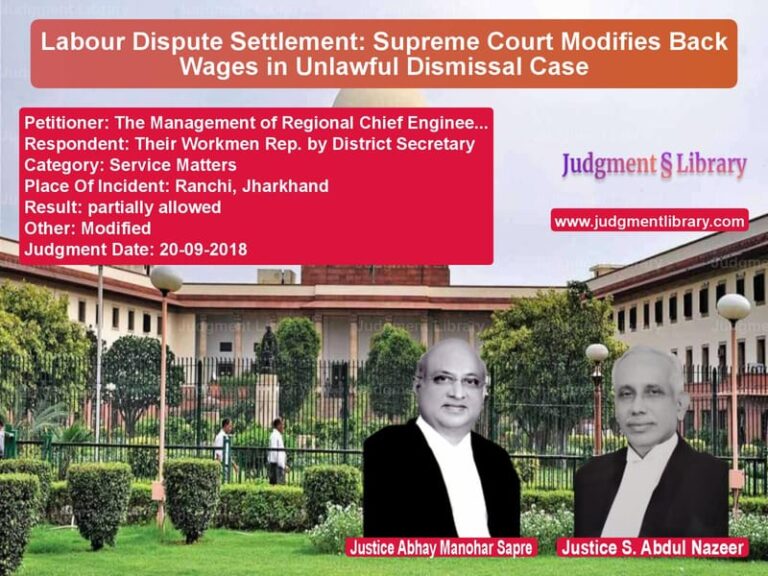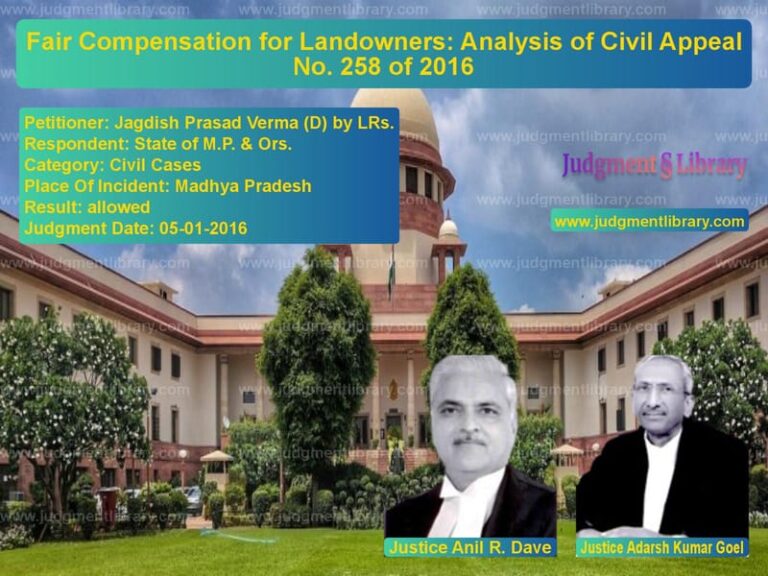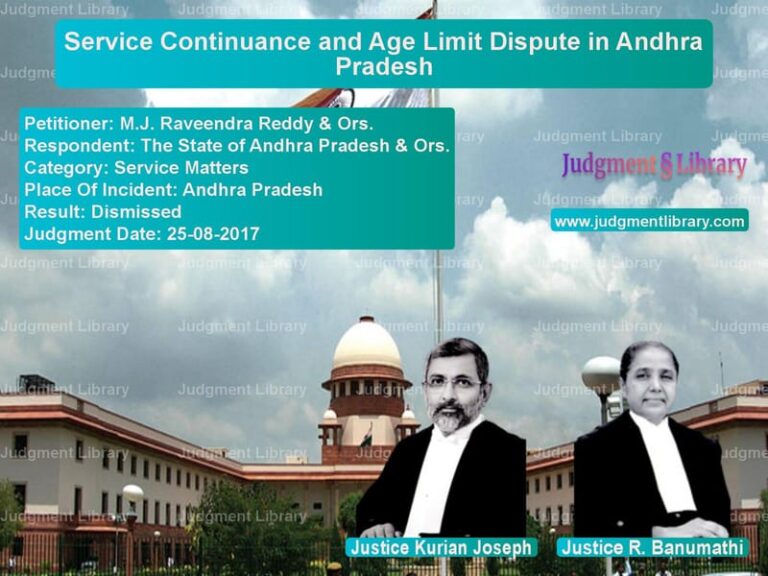Landmark Judgment on Motor Vehicle Accident Compensation: A Detailed Analysis
Road accidents are an unfortunate reality that often lead to complex legal disputes regarding compensation claims. In this particular case, the Supreme Court addressed the issues related to compensation for the deceased’s family under the Motor Vehicles Act, 1988. The judgment serves as a precedent for ensuring just compensation for victims’ families and reinforcing the purpose of the Act.
Background of the Case
The case revolves around a fatal accident involving the victim, Rajendra Prasad, who was traveling in a private bus. The accident occurred due to the negligence of the driver of a speeding truck bearing registration number HR-55A-7729. The impact led to severe injuries, resulting in the death of Rajendra Prasad on the spot. His legal heirs subsequently filed a claim under Section 166 of the Motor Vehicles Act, 1988, seeking fair compensation for their irreparable loss.
Proceedings Before the Motor Accident Claims Tribunal (MACT)
The claimants presented documentary evidence such as the FIR, charge sheet, post-mortem report, and registration details of the vehicles involved. However, the MACT dismissed the claim on technical grounds, citing procedural lapses such as the failure to formally exhibit the documents in court.
Appeal Before the High Court
Aggrieved by the MACT’s decision, the claimants approached the Rajasthan High Court, which upheld the dismissal of the claim. The High Court ruled that the claimants had not fulfilled the technical requirements needed to prove their case.
Supreme Court’s Intervention
The case was then brought before the Supreme Court, which critically analyzed the approach taken by the lower courts. The Court observed the following key points:
- The Motor Vehicles Act is a welfare legislation intended to provide relief to victims of accidents and their families.
- Strict adherence to procedural formalities should not defeat the very purpose of the Act.
- The claimants had submitted sufficient documentary evidence to prove their case.
- The burden of disproving the claim rested on the insurance company, which had failed to discharge it.
Key Arguments Presented
Petitioner’s Arguments:
- The petitioners argued that Rajendra Prasad was the sole earning member of the family and his untimely death had caused severe financial and emotional distress.
- The accident was solely due to the negligence of the truck driver, as evidenced by the FIR and charge sheet.
- The rejection of the claim based on procedural technicalities was unjustified.
Respondent’s Arguments:
- The insurance company contended that the claimants had failed to prove the negligence of the truck driver beyond reasonable doubt.
- They further argued that the compensation amount sought by the claimants was excessive and unjustified.
Supreme Court’s Observations
The Supreme Court, in its judgment, made the following observations:
- The deceased was 25 years old, employed, and had a steady income.
- The FIR, charge sheet, and post-mortem report collectively established the occurrence of the accident and the resulting fatality.
- The negligence of the truck driver was evident from the charge sheet filed by the police.
- There was no contributory negligence on the part of the deceased.
Calculation of Compensation
The Court adopted the multiplier method for determining fair compensation:
- Annual income of deceased: Rs. 5,00,000
- Future prospects added (40% increase as per guidelines): Rs. 2,00,000
- Total income considered: Rs. 7,00,000 per annum
- Deduction for personal expenses (1/3rd): Rs. 2,33,333
- Final annual dependency: Rs. 4,66,667
- Multiplier applied (17 as per age of deceased): Rs. 79,33,339
- Loss of consortium: Rs. 40,000
- Funeral expenses: Rs. 15,000
- Loss of estate: Rs. 15,000
Total Compensation Awarded: Rs. 79,93,339
The Supreme Court directed the insurance company to deposit the entire compensation amount within three months, with an interest rate of 7.5% per annum from the date of filing.
Legal Precedents Referred
- Sarla Verma & Ors. v. Delhi Transport Corporation & Anr. (2009) – Guidelines for calculating compensation.
- National Insurance Co. Ltd. v. Pranay Sethi & Ors. (2017) – Addition of future prospects.
Conclusion
This Supreme Court ruling reiterates the principle that procedural lapses should not prevent victims’ families from receiving fair compensation. It sets a significant precedent for accident compensation cases, emphasizing that the provisions of the Motor Vehicles Act must be interpreted to achieve their intended welfare purpose.
Petitioner Name: Vimla Devi & Ors..Respondent Name: National Insurance Company Limited & Anr..Judgment By: Justice Abhay Manohar Sapre, Justice Indu Malhotra.Place Of Incident: Chomu, Rajasthan.Judgment Date: 16-11-2018.
Don’t miss out on the full details! Download the complete judgment in PDF format below and gain valuable insights instantly!
Download Judgment: Vimla Devi & Ors. vs National Insurance C Supreme Court of India Judgment Dated 16-11-2018.pdf
Direct Downlaod Judgment: Direct downlaod this Judgment
See all petitions in Compensation Disputes
See all petitions in Motor Vehicle Act
See all petitions in Road Accident Cases
See all petitions in Judgment by Abhay Manohar Sapre
See all petitions in Judgment by Indu Malhotra
See all petitions in allowed
See all petitions in supreme court of India judgments November 2018
See all petitions in 2018 judgments
See all posts in Accident Cases Category
See all allowed petitions in Accident Cases Category
See all Dismissed petitions in Accident Cases Category
See all partially allowed petitions in Accident Cases Category







